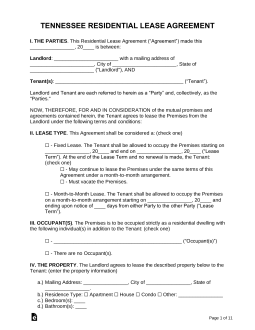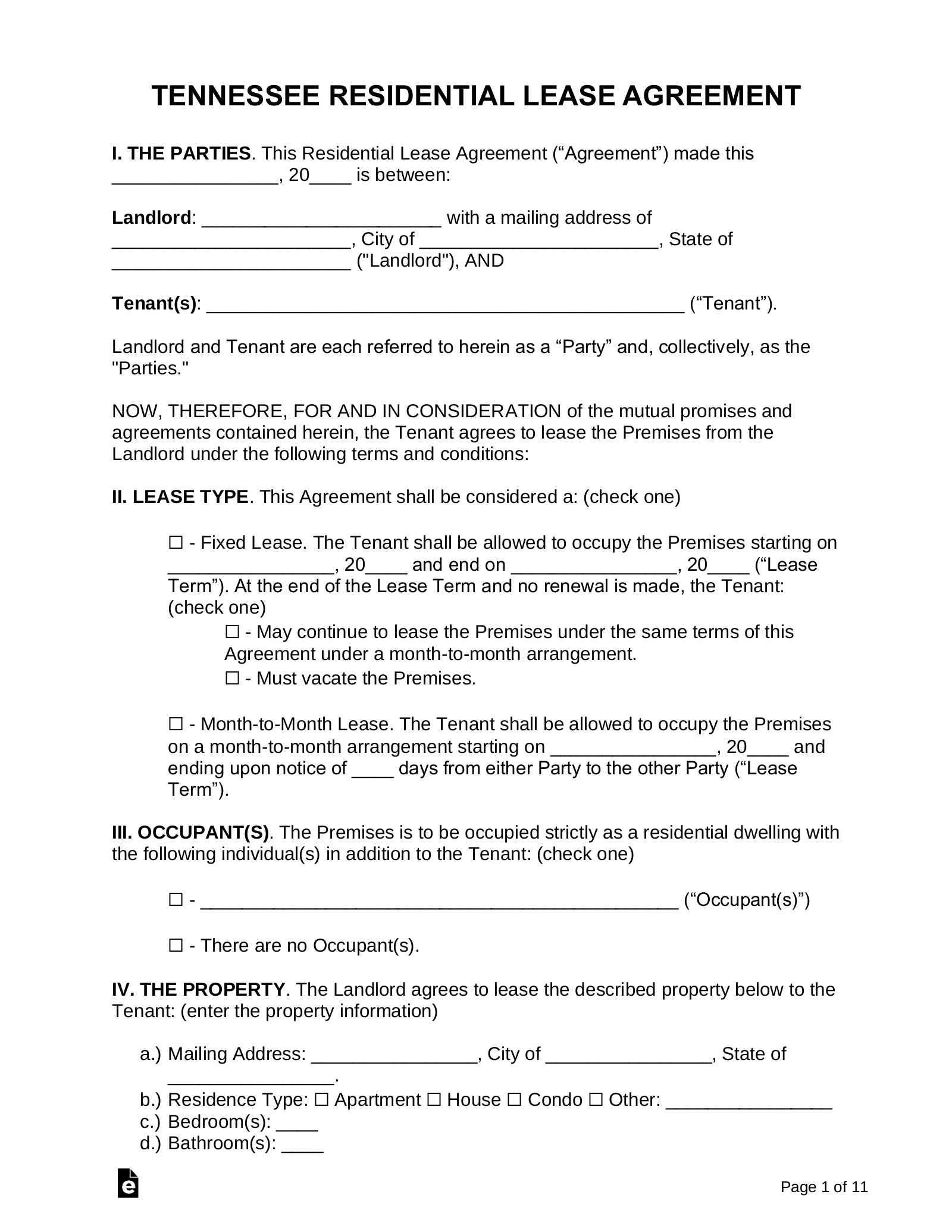Updated February 20, 2024
A Tennessee lease agreement is a written contract between a landlord and a tenant for the renting of property. The landlord will usually require the tenant’s personal information and consent to run a credit check prior to signing a lease. Once signed, the document is legally binding to both parties.
Table of Contents |
Agreement Types (8)
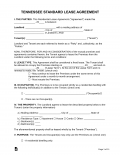 Standard Residential Lease Agreement – For a residence with a specified start and end date for the term. Standard Residential Lease Agreement – For a residence with a specified start and end date for the term.
Download: PDF, MS Word, OpenDocument |
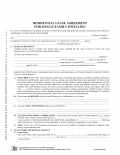 Association of Realtors – For standard tenancies in a single-family dwelling. Association of Realtors – For standard tenancies in a single-family dwelling.
Download: PDF |
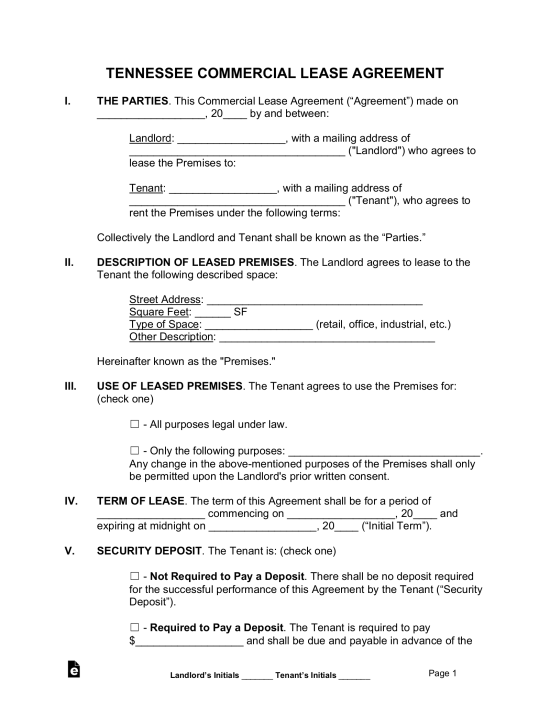 Commercial Lease Agreement – For business or professional use, mostly as an office, retail, or industrial related. Commercial Lease Agreement – For business or professional use, mostly as an office, retail, or industrial related.
Download: PDF, MS Word, OpenDocument |
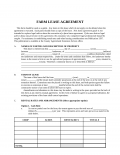 Farm Lease Agreement – For a structure and/or land used for the growing and nurturing of crops. Farm Lease Agreement – For a structure and/or land used for the growing and nurturing of crops.
Download: PDF |
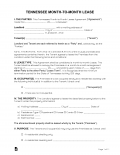 Month-to-Month Lease Agreement – Known also as a tenancy at will that allows the landlord or tenant to cancel the arrangement with at least 30 days’ notice. Month-to-Month Lease Agreement – Known also as a tenancy at will that allows the landlord or tenant to cancel the arrangement with at least 30 days’ notice.
Download: PDF, MS Word, OpenDocument |
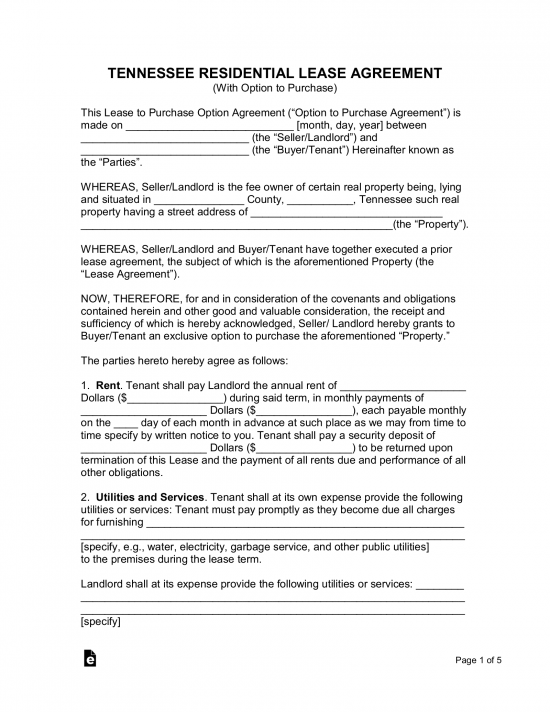 Rent-to-Own Lease Agreement – Residential contract that allows a landlord-tenant arrangement with the added choice of the tenant being able to buy the property. Rent-to-Own Lease Agreement – Residential contract that allows a landlord-tenant arrangement with the added choice of the tenant being able to buy the property.
Download: PDF, MS Word, OpenDocument |
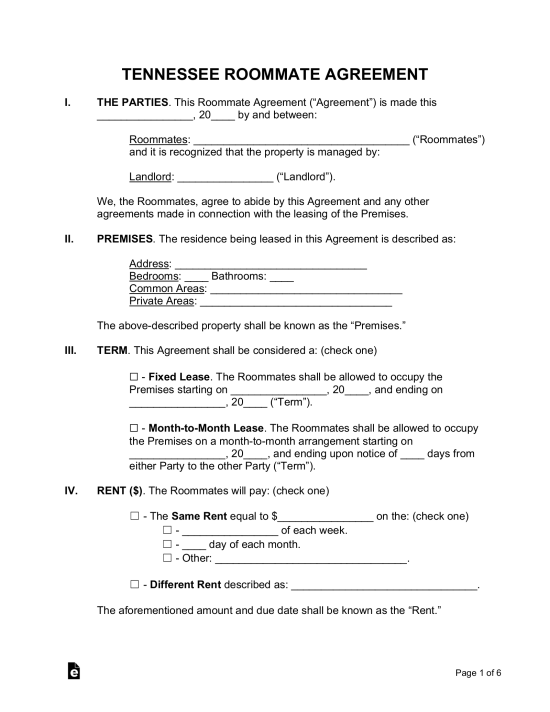 Room Rental (Roommate) Agreement – When the individuals living in the same home agree to the cleaning of common areas and expenses, fees, and utilities to be paid in relation to the residence. Room Rental (Roommate) Agreement – When the individuals living in the same home agree to the cleaning of common areas and expenses, fees, and utilities to be paid in relation to the residence.
Download: PDF, MS Word, OpenDocument |
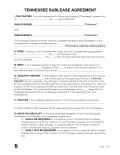 Sublease Agreement – The act of a tenant electing someone else to use residential space they have under agreement with the landlord/manager. If required, the landlord will have to grant their consent before authorizing. Sublease Agreement – The act of a tenant electing someone else to use residential space they have under agreement with the landlord/manager. If required, the landlord will have to grant their consent before authorizing.
Download: PDF, MS Word, OpenDocument |
Required Disclosures (3)
- Agent/Landlord Identification – The name and address of the owner of the property, or the agent thereof, and the person authorized to manage the premises must be disclosed to the tenant in writing at or before the start of tenancy.[1]
- Lead-Based Paint Disclosure – If the residence was constructed before 1978, the landlord must inform the tenant of the possible existence of lead-based paint on the premises.
- Showings – If the landlord wishes to be able to show the premises to prospective tenants during the final 30 days of tenancy, the right to access the property for this purpose must be stated in the rental agreement.[2]
Security Deposits
Maximum Amount – There is no statutory limit on how much a Tennessee landlord may demand for a security deposit.
Collecting Interest – A landlord in Tennessee is not required to collect or pay interest on a security deposit.
Returning – The landlord must return the security deposit to the tenant within 30 days of their having vacated the premises.[3]
- Itemized List – Upon the request of the tenant, the landlord must provide a written copy of the comprehensive list of damages to the unit used by the landlord to withhold any portion of the security deposit.[4]
When is Rent Due?
Grace Period – There is a five-day grace period, beginning when rent is due, during which the landlord cannot charge a late fee or start eviction proceedings.[5] If the rent remains unpaid after this period, the landlord may send a 14-day notice to quit.
Maximum Late Fee – 10% of the monthly rent amount is the maximum allowable late fee.[5]
NSF Fee – $30 is the maximum allowable charge for a bounced check.[6]
Withholding Rent – If the landlord fails to supply essential utility services to the dwelling, the tenant may, after giving notice, procure these utilities on their own and deduct the cost of the services from the rent.[7]
Right to Enter (Landlord)
Standard Access – Tennessee landlords have the right to have reasonable access to the property to perform routine inspections, repairs, or services.[8] If the landlord wishes to show the unit to a prospective tenant, they must give at least 24 hours’ notice.[2]
Immediate Access – The landlord may enter the property without the consent of the tenant during an emergency.[9]
Abandonment
Absence – If the tenant is absent without explanation for 30 days or more, and they are also in default on rent, then the rental property may be assumed to be abandoned.[10]
Breaking the Lease – A tenant may terminate the lease without liability for future rent if they are a victim of domestic abuse, sexual assault, or stalking.[11]
Tenant’s Utility Shutoff – If the tenant has voluntarily terminated their utilities, and they are also at least 15 days late in paying rent, then it may be assumed that they have abandoned the rental property.[12]
Unclaimed Property – If a tenant has abandoned the premises, the landlord must store any remaining personal property for at least 30 days, after which time they may sell or otherwise dispose of it.[13]

